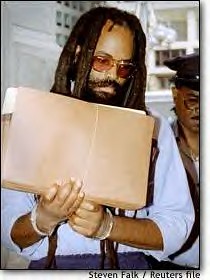
Mumia Abu-Jamal has gained international support for his appeal after spending nearly 25 years in prison for a crime he did not commit., a photo by Pan-African News Wire Photo File on Flickr.
Mumia Abu-Jamal won't face death penalty
Kathy Matheson, Associated Press
Wednesday, December 7, 2011
Prosecutors on Wednesday abandoned their 30-year push to execute convicted cop-killer Mumia Abu-Jamal, the former Black Panther whose claim that he was the victim of a racist legal system made him an international cause celebre.
Abu-Jamal, 58, will instead spend the rest of his life in prison.
Standing next to police Officer Daniel Faulkner's widow, Philadelphia District Attorney Seth Williams announced his decision two days short of the 30th anniversary of the white patrolman's killing.
He said that continuing to seek the death penalty could lead to "an unknowable number of years" of appeals and that some witnesses have died or are unavailable after nearly three decades.
"There's never been any doubt in my mind that Mumia Abu-Jamal shot and killed Officer Faulkner. I believe that the appropriate sentence was handed down by a jury of his peers in 1982," said Williams, the city's first black district attorney. "While Abu-Jamal will no longer be facing the death penalty, he will remain behind bars for the rest of his life, and that is where he belongs."
Abu-Jamal was originally sentenced to death. His murder conviction was upheld through years of appeals. But in 2008, a federal appeals court ordered a new sentencing hearing on the grounds that the instructions given to the jury were potentially misleading.
After the U.S. Supreme Court declined to weigh in two months ago, prosecutors were forced to decide whether to pursue the death penalty again or accept a life sentence without parole.
Williams said he reached the decision with the blessing of Faulkner's widow, Maureen.
Widener University law Professor Judith Ritter, who represented Abu-Jamal in recent appeals, welcomed the move.
"There is no question that justice is served when a death sentence from a misinformed jury is overturned," Ritter said. "Thirty years later, the district attorney's decision not to seek a new death sentence also furthers the interests of justice."
According to trial testimony, Abu-Jamal saw his brother scuffle with the patrolman during a 4 a.m. traffic stop in 1981 and ran toward the scene. Police found Abu-Jamal wounded by a round from Faulkner's gun. Faulkner, shot several times, was killed. A .38-caliber revolver registered to Abu-Jamal was found at the scene with five spent shell casings.
Over the years, Abu-Jamal challenged the predominantly white makeup of the jury, the instructions given to the jurors and the accounts of eyewitnesses. He also complained that his lawyer was ineffective, that the judge was racist and that another man confessed to the crime.
No comments:
Post a Comment